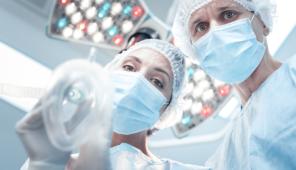What it is like for front line healthcare workers
Dr Punam Krishan, GP and media writer, shares what it's really like for front line healthcare workers during the covid-19 pandemic

“How many times do I need to tell you to keep away from me?” That was what my husband shouted at our six-year-old who just wanted to hug his daddy, something that was a normal thing to do before.
With his voice shaking, the pain palpable, I watched my husband walk upstairs and close the door of his room. Yes, his room: segregated not through choice but through need.
So, I scooped up my little boy, hugged him tightly and explained to him for what felt like the 100th time why daddy has to keep away from us just now.
This is the reality for many front-line healthcare professionals right now as they put everything aside to honour the commitment they made when they chose to dedicate their lives to medicine.
My husband and I are both GPs working in the National Health Service in the United Kingdom. I have recently started my maternity leave. However, my husband continues to work full time on the front line, battling the coronavirus outbreak every day.
He also does extra hours for our “out of hours” service in order to help meet the demand as the number of cases of coronavirus continues to rise. Sadly, not only are we practically living apart, due to the level of risk he has of contracting COVID-19, he may not even attend the birth of our baby, a moment precious to all parents.
I still recall my interview at the University of Glasgow medical school in 2001, where I was asked why I wanted to be a doctor.
My answer was simple: “Because I want to help save lives.” For those who opt for a career in medicine, it is more than just a job – it is a vocation. It is a real, guttural calling that cannot be articulated as you always strive to do good, do no harm and provide a duty of care to your patients.
As I proudly accepted my medical degree 14 years ago, I appreciated there would be some tough times when I would need to make some really challenging decisions but never did I think my job could put me in a position where I could potentially risk the lives of others, of my family or even my own.
Fast forward to the present day and healthcare professionals across the world find themselves working under immense pressure, feeling anxious and fearful of what lies ahead, to do their bit in the fight against one of the greatest challenges of our time; the fight against COVID-19.
What we are being asked to do is necessary but it is incredibly toughon many levels.
Here, in the UK, we are just at the beginning of our uphill struggle. We have been closely monitoring trends across the world so we are fully informed about the impact that coronavirus will have on our citizens, our economy and the future once it hits us properly.
We have seen the pressures that our healthcare colleagues around the world have been put under and it paints a very bleak picture.
As we get ready for work every day, we read the headlines about more doctors dying from coronavirus, but we try to shield our loved ones from this and we try to block out the noise in our heads.
Our anxiety levels are high but knowing that our healthcare systems need us – now more than ever – compels us to push our emotions to one side as we take things one day at a time, stretched beyond our limits.
Why are clinicians so vulnerable?
There have been several issues that have made doctors, nurses and other healthcare workers feel more vulnerable and unsupported.
A serious delay in the issuing of personal protective equipment (PPE) in the UK as well as in other countries around the world has seen front-line workers delivering care to coronavirus positive patients without any consideration for their safety.
You only need to take a scroll on social media to witness some of the desperate lengths doctors and nurses are going to in order to protect themselves – these are far from danger proof, but we are trying to do our best in order to not compromise care.
The virus is spread via close contact through respiratory droplets produced when an infected person coughs or sneezes.
Without any PPE, the risk of transmission to a clinician is very high. The implications of this are monumental in the spread of the pandemic because once exposed, the clinician could be at risk of getting unwell themselves – something the NHS and other healthcare systems around the world cannot afford.
These clinicians are also at a higher risk of transmitting the infection to other people and members of their community as they commute through the city to get home, and then expose their families to it.
In trying to save one life, we are potentially compromising the lives of many others at the same time. Carrying this burden hinders our ability to work and deliver care effectively, and potentially compromises the quality of clinical work.
Nobody is a winner here. The UK, where I am, has entered a lockdown as cases and deaths continue to rise but many doctors are still working without adequate PPE. How can we delay the spread when we may well be contributing to it in the first place?
Another significant issue compromising us and our patients is the lack of testing. We are trying to fight a pandemic without knowing the magnitude of the problem.
In the UK, for example, only those who are hospitalised are being tested. In primary care, we are running on presumptions. More critical, perhaps, is the lack of testing of front-line healthcare workers. We are facing sleepless nights as we have no idea if we are carrying the virus or not.
How can others help?
People can help us by self-isolating if at all possible, but I worry that lockdown – such as that enacted at last in the UK and already enacted in many other countries – has been an action taken a little too late.
We all have to make tough decisions about whether we really should be out and about. After finding myself in a confined space, travelling with a patientwith symptoms suggestive of COVID-19 a week ago, I decided enough was enough.
At 34 weeks pregnant, sitting in a small consultation room without any PPE and with limited knowledge about how coronavirus might affect my unborn baby or my child at home, I realised it is just not a risk I am willing to take.
There was no option for me to explore other ways of working, nor was there any guidance so I started my maternity leave.
Many female healthcare workers are in the same predicament and it is causing us to make some difficult choices. However, my husband continues to work. He only received PPE this week but the worry remains – could he already be a carrier?
How can healthcare workers protect themselves?
There are measures that doctors and healthcare workers can take to minimise their risk of exposure and therefore their risk of passing it on to their families who may also be vulnerable.
Have dedicated work clothes which you only wear at work and wash them at a high temperature as soon as you get home.
When you get home, have a dedicated plastic box where you put your coat, shoes, etc. Keep everything you take outside segregated from the rest of your family.
Immediately shower and keep a distance of more than 2 metres from your family members at all times. No cuddles with anyone, just say hello.
Avoid touching any door handles and surfaces until you and they are clean using normal disinfectant or detergent. This includes your phone, which you should have locked away when at work.
If you are travelling by car, wipe down the steering wheel, controls and door handles. Have in your bag some wipes or a disinfectant spray and kitchen roll as well as gloves. Dispose of these in a sealed bag immediately once cleaned.
None of these measures feels normal because the situation we are facing is far from normal.
In the UK, as in other countries, many retired doctors and nurses are returning to work to help alleviate the burden on healthcare workers, which goes to show just how much this vocation means to us.
Those of us who are on maternity or sick leave are using media or social media outlets to help deliver public health messages.
We are all putting our vulnerabilities, our anxieties and even our family lives to the side right now to do our bit and serve our society. I just hope that we remain protected, healthy and supported to continue to keep on doing so.
For more reflective articles on the coronavirus pandemic, check out our Doctor Diaries.
Punam Krishan
Latest posts by Punam Krishan (see all)
- What it is like for front line healthcare workers - 14th April 2020


